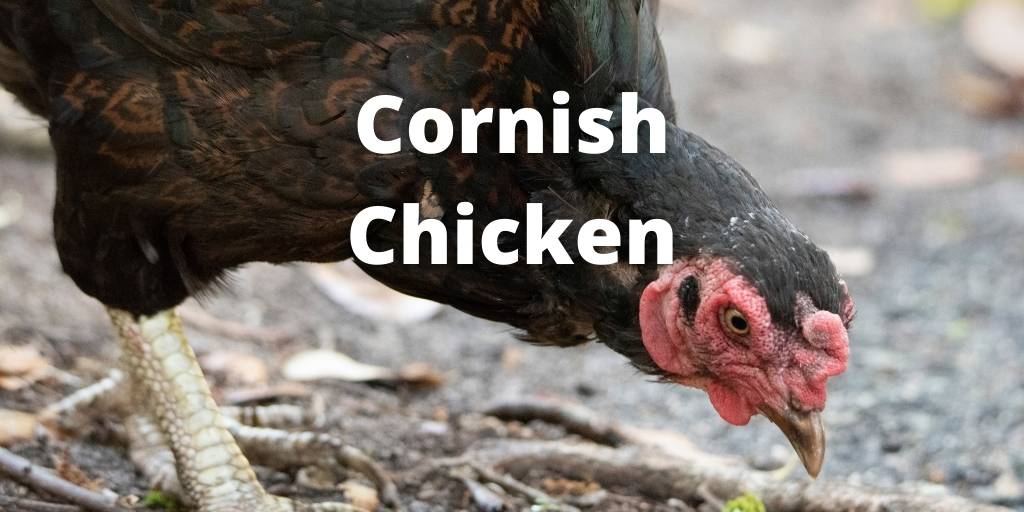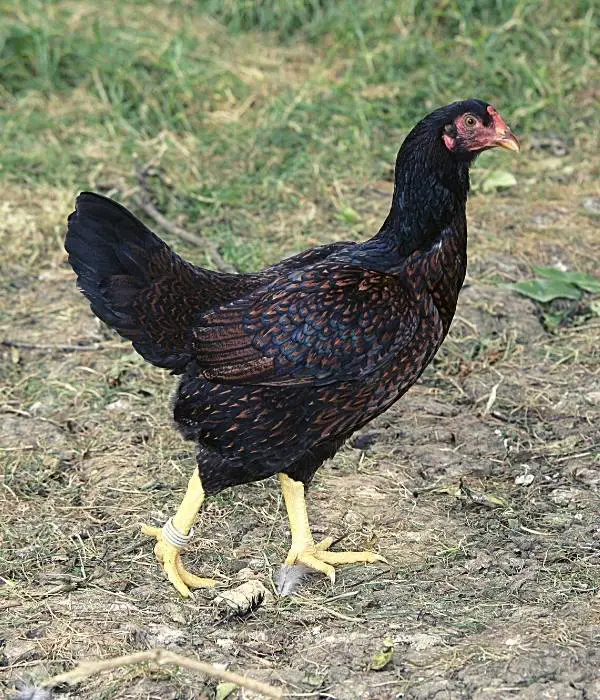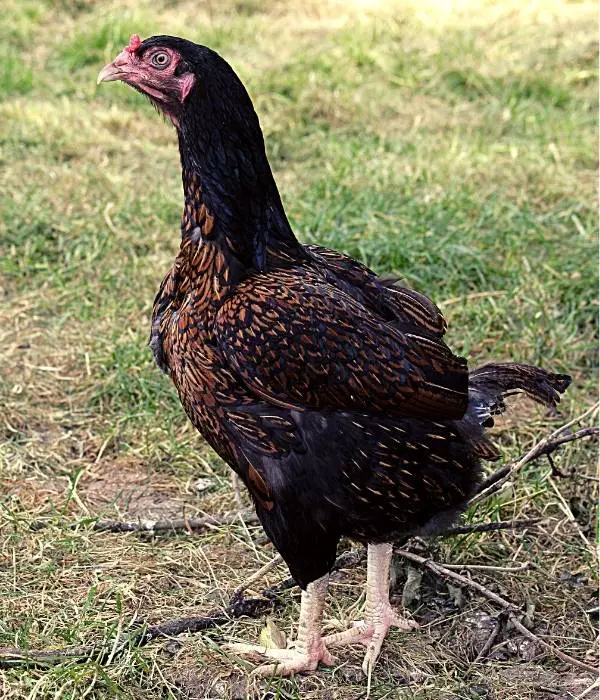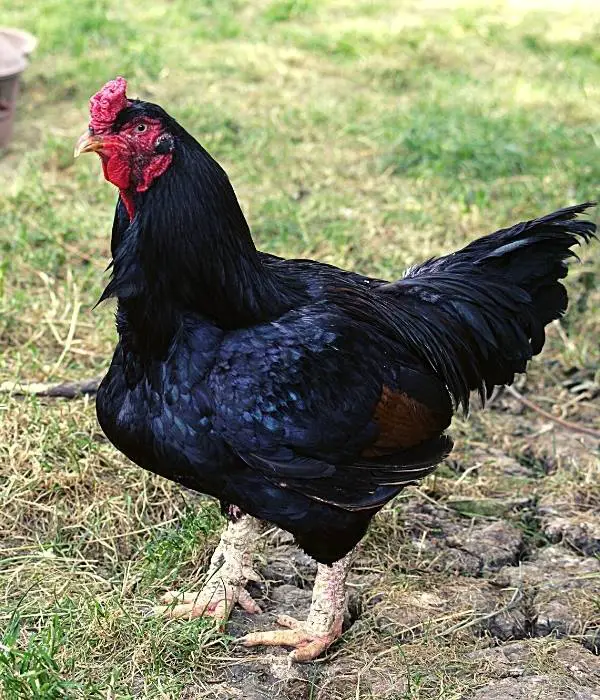
The Cornish chicken is loved by people all over the globe for its meat quality. This breed originated from Cornwall, England and is highly profitable for the meat business.
This chicken has short legs and a large body. The black, white, and red feathers enhance their beauty. The Cornish chicken can be raised in various weather conditions, from warm to cold.
High-quality meat production makes the Cornish Chicken important. It grows very fast and has a high flesh-to-bone ratio. Farmers like the Cornish Chicken because it has a high sale rate in the poultry market.
Cornish chickens are useful in high meat production and also for eggs in small amounts. Moreover, this breed is extremely popular in poultry shows and exhibits, where breeders and fans enjoy its unusual look and characteristics.
In this breed profile, you will learn all about Cornish chickens, which includes the history, color, egg production, lifespan, size, care guide, and more.
History and Origin of Cornish Chicken

Cornish chickens, sometimes called Indian Game, originated in Cornwall, England.
This breed developed by mating Malay and Old English Game with Plymouth Rock and Langshan bigger game birds. This produced a bird with a large chest, powerful physique, and unusual look.
After arriving in the US in the late 1800s, Cornish became popular meat birds. This breed’s quick development and size made it excellent for commercial meat production.
Today’s meat business depends on Cornish chickens bred with other breeds to produce broiler chickens.
The Cornish is a popular display and meat industry bird. Because of its short, stocky build, poultry raisers love it.
Cornish chickens are still popular for commercial meat production and backyard chicken raising.
Although the breed has changed throughout time, including color variations, its traits remain unchanged. Its Cornwall, England heritage has cemented its place in chicken breeding.
Cornish Chicken Color Varieties
British and American Poultry Associations recognize the Cornish Chicken. The breed has a huge size, a strong build, and unique color varieties.
APA recognizes Dark, White, and White-Laced Red Cornish chickens. The White variation is white, whereas the Dark version is black with white specks. The White-Laced Red has reddish-brown feathers with white lacing.
The UK Poultry Associations recognize Dark, Double-Laced Blue and Jubilee Cornish Chickens. The Jubilee variation has brilliant golden plumage with black and white patterns.
THe are popular with chicken lovers due to their sturdy bodies, meaty build, and lovely colors. Its acceptance by the APA and UK chicken Associations shows its significance and popularity in chicken breeding.
Lifespan
Cornish chickens live shorter than other chicken varieties and are raised for meat. On average, Cornish chickens live 6-8 weeks before processing. They may survive 12 weeks or longer with good care.
Cornish Hen Egg Production
Cornish hens lay medium to big eggs weighing 55-60 grams. The average Cornish chicken lays 150-160 eggs annually. Their eggs range from cream to light brown.
Also read: List of chickens that lay colored eggs
Cornish Chicken Temperament and Behavior

Cornish chicken, or The Indian Game, is primarily calm and docile. But the hens have the top pecking order, and the roosters are friendly.
They do not require a lot of space. Usually, they need 2-3 feet per bird. Caring is easy, but they are not suitable pets.
Cornish hens love to sit on their eggs and hatch them. Mostly, they make good broody moms. You may see very little broody mothers in some genes only.
Cornish flock cannot perform well in too much cold. They are one of the best chicken breeds for warm climates.
Most of the Cornish chickens have good resistance against various poultry diseases. But most of the chicken raisers say they are prone to parasite infestation. Use a good chicken dewormer.
Appearance
Cornish chickens are strong, large, and have a round body shape. They have white or light-brown feathers and light yellow to deep brown skin.
They have a fleshy comb on top of its head. The comb is medium to big and is single or pea-shaped in type.
The wattles of Cornish chickens are red and medium-to-large in size. They have broad, yellow, or gray legs and white or light-red color ear lobes.
The Cornish chicken beak is bright yellow in color. They are strong and beautiful meat chicken and best for beginners.
Size and Weight
The normal-sized Cornish rooster weighs 8-10 pounds, and the hen weighs 6-7 pounds. They have a wide chest, short back, and spherical body. Thick, strong legs carry their large weight easily.
Bantam roosters and hens weigh 2-3 pounds and 1.5-2 pounds, respectively. They look like the usual size but are smaller. Due to their low size and weight, their legs are thinner and weaker.
The weight of Cornish chicks depends on age and breed. They hatch at 1-2 ounces. Some breeds reach 4-5 pounds by 8 weeks.
Characteristics

Below, you can read about a few characteristics of Cornish Game chicken:
- Cornish meat chickens are huge and robust.
- They have broad breasts, short legs, and round bodies.
- Cornish chickens are available in black, red, and white colors.
- They develop quickly and reach market weight in 1-2 months.
- These chickens effectively convert feed into meat. That’s why it’s the best meat chicken.
- They are usually grown for meat, not eggs.
- Cornish chickens can survive in many climates, from warm to cold.
- They’re easygoing and quiet chickens.
- Overeating and obesity can harm Cornish hens.
- Cornish chickens are commonly utilized in crossbreeding operations to create desired hybrid meat birds due to their size.
Benefits of Raising Cornish Chickens
There are many benefits to raising Cornish chickens, including:
- Fast growth: Cornish chickens grow rapidly, reaching their selling size in six to eight weeks.
- Good muscle built: High breast meat output makes Cornish hens top of the meat chicken.
- Best for beginners: Easy to grow and handle because these birds are docile and not picky eaters.
- Flexible: Cornish chickens can live in easily free-range and confined setups.
- Disease resistance: They fight certain common chicken diseases, keeping them healthier.
- Low feed conversion rate: Cornish chickens consume less feed per pound of meat than other breeds, lowering feed expenses.
- Delicious flesh: Many people like Cornish chickens’ soft, savory meat.
- Demand: They are popular for meat production.
- Good egg layers: Cornish hens lay 160–180 eggs every year.
- Economical: They may be kept in different conditions and have a reduced feed conversion rate, making meat and egg producers cost-effective.
Problems in Raising Cornish Chickens
Like all breeds of chickens, Cornish chickens have their share of problems. Some potential issues include:
- High mortality rates: Cornish chickens have high mortality rates because of disease spread, obesity, and cardiac issues.
- Obesity: They acquire weight fast, causing obesity and other health issues due to their high-protein and fat feed.
- Heat stress: The breed is unsuitable for hot regions because they do not tolerate heat.
- Lack of exercise: Cornish hens need space to walk and exercise. The major cause of health problems is also lack of exercise.
- Feeding issues: Cornish hens are poor foragers and require a specific diet.
- Chick quality: Chicks are very sensitive in their initial life. They only survive if proper brooding is given.
- Cannibalism: Overcrowded or stressed Cornish hens may cannibalize. But it is rarely seen in these chickens, only if there is a lack of feed.
- Respiratory issues: Poor ventilation might cause respiratory issues in the breed. Ammonia from the bedding litter is dangerous for chickens living only inside the coop.
- Low egg production: Cornish hens are poor layers and may produce fewer eggs than other breeds.
- Breeding challenges: They are hybrids; breeding them takes careful selection and management.
Here is the list of 100+ best chicken treats
Care Guide For Cornish Flock
Here are some Cornish chicken care tips:
- Housing: Cornish chickens need a predator-proof, dry, draft-free, well-ventilated coop. Make sure the coop fits your hens and gives them room to move.
- Feeding: Cornish hens need protein, carbs, fats, vitamins, and minerals. You should give them some chicken’s age-specific commercial feed or prepare your own with grains, veggies, and another protein source.
- Water: Always provide clean, fresh water to your Cornish chickens. Provide adequate waterers to minimize overpopulation and clean and refill them periodically.
- Health: Cornish chickens are resilient yet sensitive to illnesses and parasites. Lethargy, appetite loss, and odd behavior are indicators of disease. See a poultry vet if you observe any of these symptoms.
- Exercise: They aren’t energetic yet require exercise to stay healthy. Allow space for movement and encourage them to forage for food.
- Temperature: Cold weather is better for Cornish chickens than warmer heat. You must give heat lights to keep them warm in really cold weather. In hot temperatures, provide shelter and cool water.
- Cleaning: The coop must be cleaned to prevent germs and parasites from growing. Clean the coop periodically, remove manure and damp bedding, and add dry bedding.
- Nesting Boxes: These hens deposit eggs in nesting boxes. Give them ample clean, dry, comfy nesting boxes.
- Socialization: Cornish chickens need company. Keep them among other hens to avoid stress and loneliness.
- Predator attacks: The hens get preyed upon by foxes, raccoons, and hawks. Secure the coop with a robust fence and lock the hens at night. Give them a daytime secure space away from predators.
Cornish Hen vs. Rooster
There is a lot of confusion about the difference between Cornish hens and roosters. Here are some key points to help you distinguish between the two:
- Hens lay eggs, while roosters do not.
- The male Cornish chickens are larger than hens and are more muscular.
- Cornish roosters have larger combs and wattles than hens.
- The hens have a perfect U-shaped curve body, but the roosters have no perfect Curve shape.
- Hens are typically docile, while roosters can be aggressive to unknown persons.
- Cornish Roosters crow to announce the dawn of each new day, while hens do not crow.
- Hens can live for up to 8 years, while roosters typically only live for 5-6 years.
So, now that you know the difference between a Cornish hen and a rooster, which one should you choose for your flock? If you are primarily interested in eggs, then a hen is the best choice.
But this breed is used explicitly for meat purposes, and the eggs are incubated further breeding.
However, if you want a more aggressive bird and can protect your flock from predators, then a rooster would be a better option. Remember, a rooster is necessary for breeding purposes, so if you are interested in raising chicks, you need to have one in your flock.
Summary
Backyard farmers should consider Cornish chickens for commercial purpose. It’s simple to grow them in medium-to-large coops.
In warm climates, this chicken breed is good for backyard farms. Since it grows quickly, this meat chicken is ideal for adding table birds.
The hens are wonderful mothers and broody, but their bodies don’t properly give heat to their eggs and chicks.
Hatching their eggs in a suitable incubator is best. I hope this information explained all about the Cornish chicken breed.


Leave a Reply